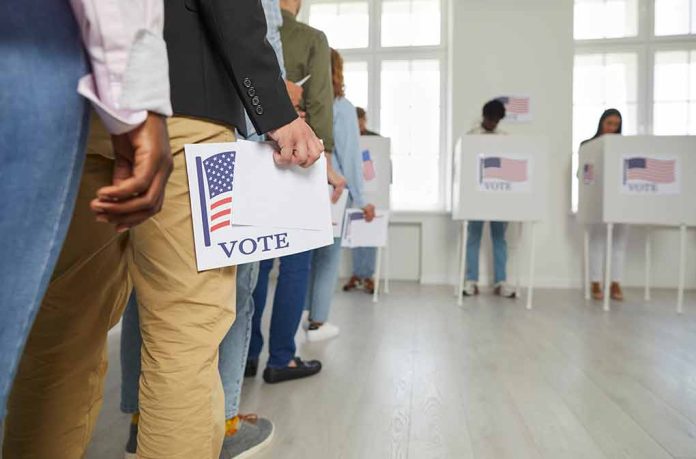
President Trump has mandated paper ballots and proof of citizenship for voter registration in an executive order aimed at overhauling America’s election system, drawing both praise for enhancing security and criticism for shifting power from states to the federal government.
Key Takeaways
- Trump’s executive order requires documentary proof of U.S. citizenship for voter registration and mandates paper ballots for voting systems
- The order directs federal departments to provide states with systems to verify citizenship status and limits counting ballots arriving after Election Day
- Election administration traditionally managed by states will see increased federal oversight, raising federalism concerns
- The order positions U.S. election security measures to align with practices used in other developed nations
- Paper ballot requirements aim to reduce disputes and increase voter confidence in election results
Strengthening Election Security Through Paper Ballots
President Trump’s executive order on election integrity introduces major changes to how Americans vote. The directive requires the Election Assistance Commission (EAC) to establish new standards for voting systems that prioritize voter-verifiable paper records. This represents a significant shift away from purely electronic voting methods that have faced scrutiny in recent elections. The requirements specifically limit the use of barcodes and QR codes in vote counting, addressing concerns that these technologies may not accurately reflect voter intent and could be vulnerable to manipulation.
The move to paper ballots aligns American election practices with those used in countries like Germany and Canada, which rely on paper ballots to provide tangible records for recounts and audits. This approach comes in response to ongoing debates about election security following the contested 2020 presidential election. The order specifically addresses voting systems like those used in Georgia, where votes are marked on touchscreens and printed with both a summary and QR code that may not always accurately represent voter choices.
Strengthening our elections is essential for restoring voter confidence. Thank you, @POTUS for signing this Executive Order which will ensure proof of citizenship, secure paper ballots, and promote transparency in our elections.
I look forward to working with President Trump as… https://t.co/ssyUwOOPix
— Congresswoman Laurel Lee (@RepLaurelLee) March 25, 2025
Citizenship Verification Requirements
A cornerstone of the executive order is the requirement for documentary proof of U.S. citizenship during voter registration. The directive instructs the Department of Homeland Security to provide states with access to systems for verifying citizenship status. This includes resources like the Social Security Number Verification Service and the Death Master File to help confirm voter eligibility. The order also facilitates information sharing between federal and state agencies to prevent non-citizens from voting in federal elections.
“Free, fair, and honest elections unmarred by fraud, errors, or suspicion are fundamental to maintaining our constitutional Republic. The right of American citizens to have their votes properly counted and tabulated, without illegal dilution, is vital to determining the rightful winner of an election,” states the order.
The citizenship verification measure draws from systems used in countries like India and Brazil, which tie voter identification to biometric databases. Federal election-related funding will now be conditioned on states complying with these federal election integrity laws. The executive order also directs the attorney general to take legal action against states that count ballots arriving after Election Day, reinforcing the concept of a uniform national election date.
States’ Rights and Federal Oversight
The order has sparked debate about the appropriate balance between state and federal control of elections. Traditionally, election administration in the United States has been managed by states and counties, with Congress imposing additional rules as needed. The United States Election Assistance Commission was established to be a bipartisan and independent body that approves voting technologies and advises on best practices. Critics argue that the new executive order shifts power from states to the presidency in ways that may challenge longstanding federalism principles.
The executive order revokes previous directives promoting voting access and instead prioritizes election security. It instructs federal departments to assist in verifying voter eligibility and mandates a comprehensive report on compliance with the new requirements. The order also gives certain federal departments the power to subpoena voter registration records, a provision that represents a significant expansion of federal authority over state election procedures. This shift has drawn both support from those concerned about election integrity and criticism from those who view it as federal overreach.
Sources:
- Trump’s executive order on elections is a blatant power grab
- Preserving and Protecting the Integrity of American Elections – The White House
- Trump Signs EO Requiring Proof Of Citizenship, Paper Ballots



